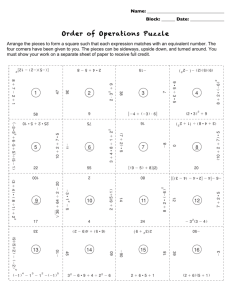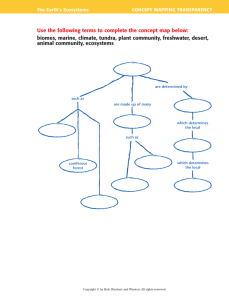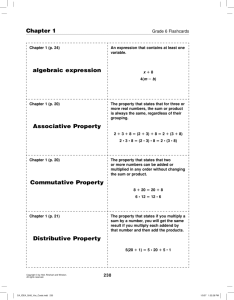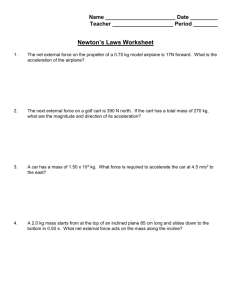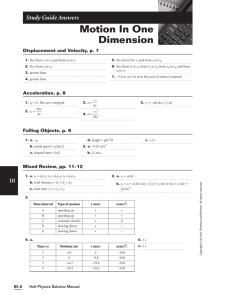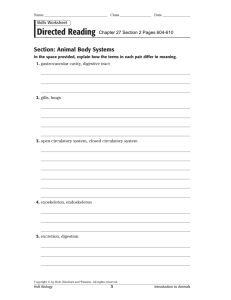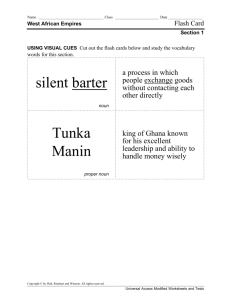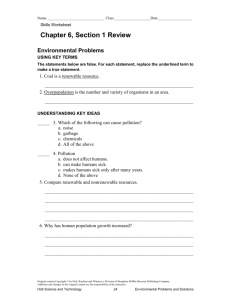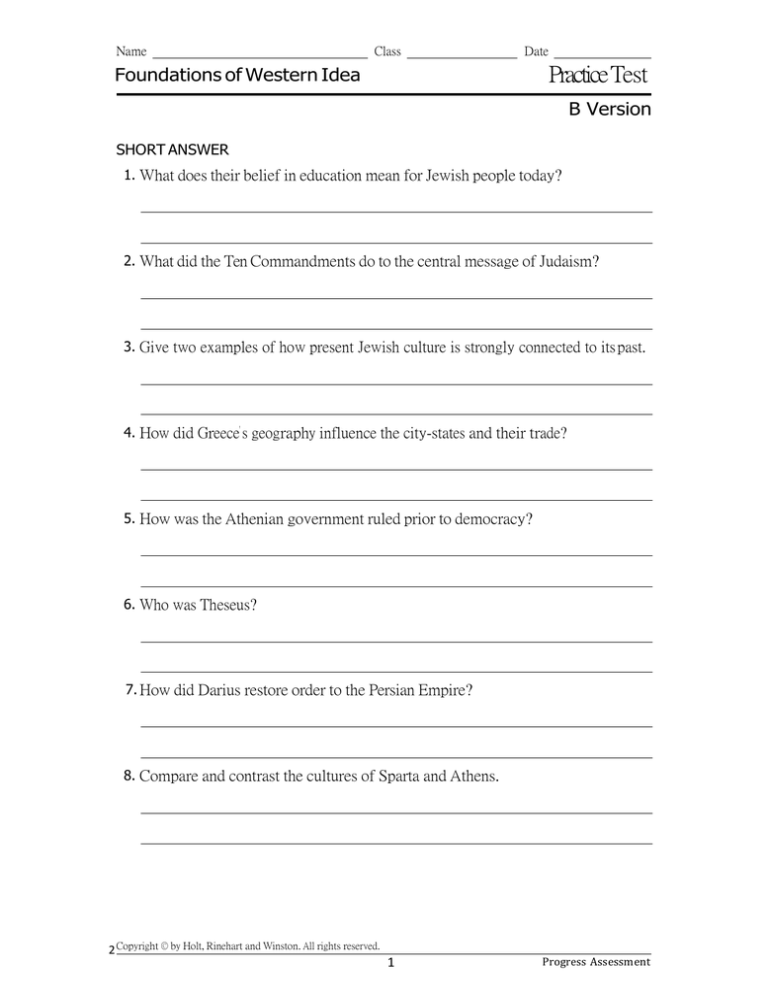
Name
Class
Date
Practice Test
Foundations of Western Idea
B Version
SHORT ANSWER
1. What does their belief in education mean for Jewish people today?
2. What did the Ten Commandments do to the central message of Judaism?
3. Give two examples of how present Jewish culture is strongly connected to its past.
4. How did Greece’s geography influence the city-states and their trade?
5. How was the Athenian government ruled prior to democracy?
6. Who was Theseus?
7. How did Darius restore order to the Persian Empire?
8. Compare and contrast the cultures of Sparta and Athens.
2 Copyright © by Holt, Rinehart and Winston. All rights reserved.
1
Progress Assessment
Name
Class
Date
Foundations of Western Ideas, continued
9. What made Philip such a successful military leader?
10. Why was Thucydides important?
2 Copyright © by Holt, Rinehart and Winston. All rights reserved.
1
Progress Assessment
Name
Class
Date
Foundations of Western Ideas, continued
PRACTICING SOCIAL STUDIES SKILLS
Study the information below and answer the questions that follow.
11. What is one possible reason that the yad is used when reading the Torah?
2 Copyright © by Holt, Rinehart and Winston. All rights reserved.
1
Progress Assessment
Name
Class
Date
Foundations of Western Ideas, continued
POINTS OF VIEW
Views of Education
Plato, an Athenian, thought that education for
young boys should train both the mind and the
body. He wanted students to be prepared for
all aspects of life as adults.
And what shall
“
be their education?
Reading and writing they
“
gave them, just enough to
Can we find a better
division than the traditional sort?—and
this has two divisions,
gymnastics for the
body, and music for
the soul.
”
Lycurgus, a Spartan lawgiver,
thought education for boys
should teach them how to fight.
The historian Plutarch described
how education was handled in
Sparta under Lycurgus:
serve their turn; their chief
care was to make them good
subjects, and to teach them
to endure pain and conquer
in battle.
—Plato
from The Republic
”
—Plutarch
from Life of Lycurgus
12. What was the most important aspect of life in Sparta?
13. According to the information above, which city included music in its education
of young boys?
2 Copyright © by Holt, Rinehart and Winston. All rights reserved.
1
Progress Assessment
Name
Class
Date
Foundations of Western Ideas, continued
TRUE/FALSE
1. Although Hebrew women had very few rights, they were allowed to inherit property
even if they had brothers.
2. The Dead Sea Scrolls were found by a young boy exploring a small cave near the
Dead Sea.
3. The Maccabees were a Jewish family that was tired of foreign rule.
4. Because they lived on an island, the Mycenaeans spent much of their time at sea.
5. The citizens in the early democracy of Athens voted by writing on paper.
6. It was natural for the ancient Greeks to produce great works of literature because
they had always enjoyed telling myths and stories.
7. Cyrus the Great’s treatment of conquered people helped him successfully rule a
large empire.
8. The democratic society of Athens allowed women to have more rights than in
other cities.
9. Hellenistic culture influenced the building of the world’s largest library in
Alexandria, Egypt.
10. Greek statues of people were usually not very realistic.
MATCHING
Match each item with the correct statement.
1. God promised to lead this man to a new land and
make his descendants into a mighty nation.
2. A set of commentaries, stories and folklore
3. A time for Jews to remember the Exodus from
Egypt
4. A code of moral laws written on two stone
tablets
5. Written 2,000 years ago by Jews to explain
ancient Jewish beliefs
a. democracy
b. Hippocrates
c. Pericles
d. Zoroastrian
e. Dead Sea Scrolls
f. Zealots
g. aristocrats
h. Ten Commandments
Copyright © by Holt, Rinehart and Winston. All rights reserved.
141
Progress Assessment
Name
Class
Date
Foundations of Western Ideas, continued
6. Rebellious Jews who didn’t think Jews should
answer to anyone but God
7. A Greek famous for his fables
8. A leader who used force to hold power
9. An age marked by great achievements
i. Parthenon
j. High Holy Days
k. Passover
l. fables
m. reason
10. Rich landowners
11. Short stories that teach the reader lessons about
life or give advice on how to live.
12. A body of stories about gods and heroes that try to
explain how the world work
13. A unit of soldiers mounted on horses
14. A religion based on the battle between good and
evil
15. An agreement to work together
n. cavalry
o. satraps
p. Thucydides
q. Abraham
r. Aesop
s. phalanx
t. Talmud
16. Governors of Persian provinces
u. classical
17. A group of warriors standing close together in a
square
18. A building constructed in Athens in the 400s
BC
19. Clear and ordered thinking
v. rabbis
w. tyrant
x. polis
y. mythology
20. The greatest Greek doctor
z. alliance
Copyright © by Holt, Rinehart and Winston. All rights reserved.
142
Progress Assessment
Answer Key
B Version Answers
SHORT ANSWER
1. Jews believe in teaching children the
basics of Judaism and expect both boys
and girls to study these beliefs today.
2. The Ten Commandments state ten
moral laws. By accepting these moral
laws, the Hebrews promised to
worship only one God as well as agree
to other moral laws outlining murder,
adultery, and envy.
3. Jewish people today celebrate Hanukkah
in December every year and Passover in
March or April each year. Also
celebrated by Jewish people are the
High Holy Days, which help today’s
Jews feel more connected to their past.
Copyright © by Holt, Rinehart and Winston. All rights reserved.
379
Progress Assessment
Answer Key
TRUE/FALSE
1.
2.
3.
4.
5.
4. Greece was located near the sea and
therefore was used as a source of food and
a way of trading with other communities.
5. Athens was ruled by kings, aristocrats,
and an oligarchy before it became a
democracy.
6. Theseus was one of the most famous
heroes in Greek mythology, especially
to Athenians. According to legend, he
traveled to Crete and killed the Minotaur.
7. Darius divided the empire into
20 provinces, each ruled by a governor
called a satrap. Darius made sure that the
satraps remained loyal, and called himself
“king of kings.”
8. Athenian boys had to spend two years in
the military. Spartan boys had to serve
for many years. Education was more
important in Athens. Women in Sparta
had more rights than women in Athens.
9. Philip’s soldiers fought as a phalanx like
the Greeks, but they had longer spears so
they could attack first in battle. Philip also
used cavalry and archers to support the
phalanx.
10. Thucydides wrote a history of the
Peloponnesian War, in which he fought.
He tried to tell about the war in a way that
was fair to both sides. He influenced later
historians.
F
T
T
F
F
6. T
7. T
8. F
9. T
10. F
MATCHING
1. Q
2. T
3. K
4. H
5. E
6. F
7. R
8. W
9. U
10. G
11. L
12. Y
13. N
14. D
15. Z
16. O
17. S
18. I
19. M
20. B
PRACTICING SOCIAL STUDIES SKILLS
11. People probably use pointers instead of
the touching the Torah with their hands
because the Torah is sacred, and they want
to treat it carefully.
12. The most important aspect of life in
Sparta was preparing for wars.
13. Music was a part of the education of boys
in Athens.
Copyright © by Holt, Rinehart and Winston. All rights reserved.
380
Progress Assessment

